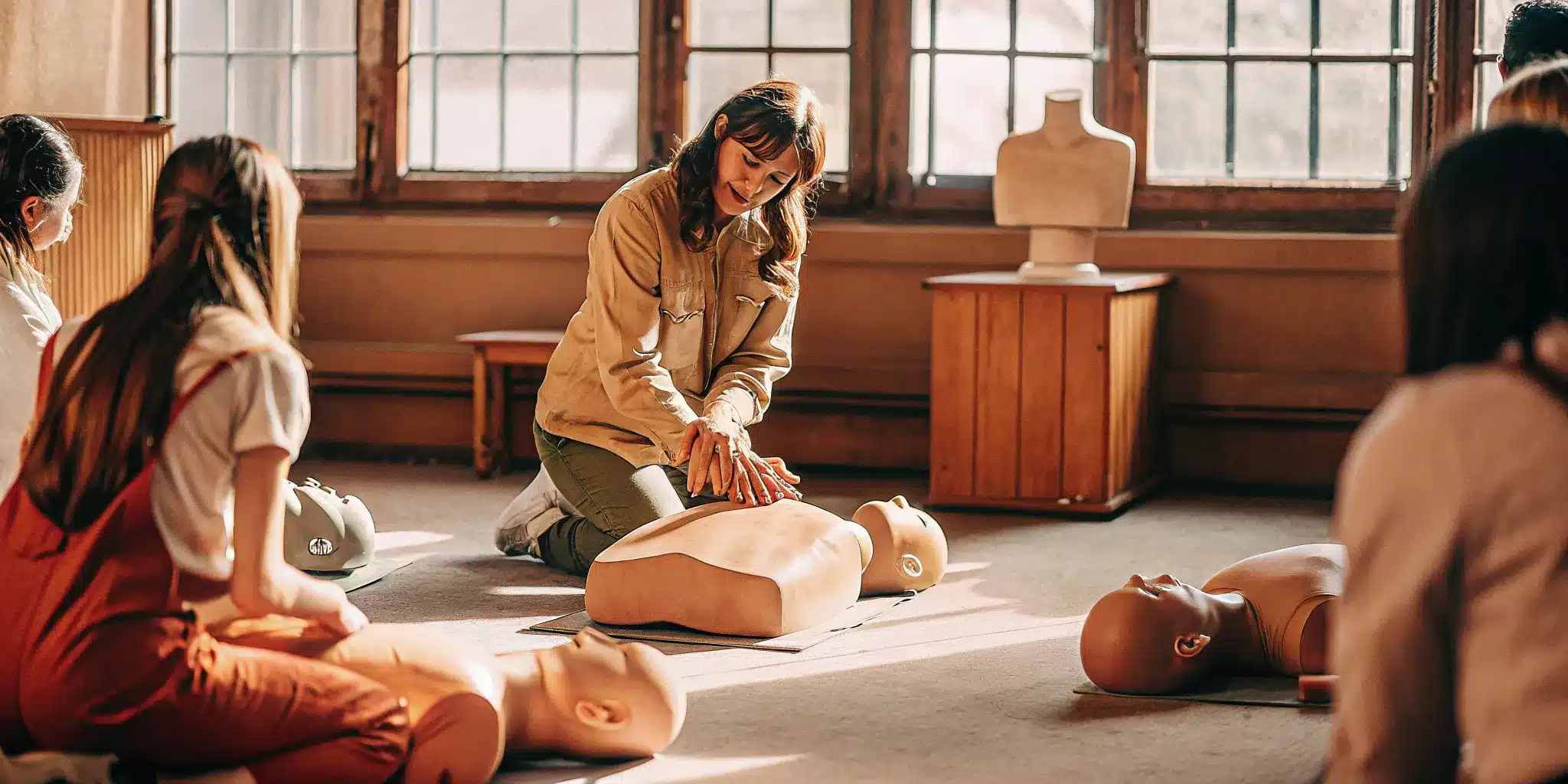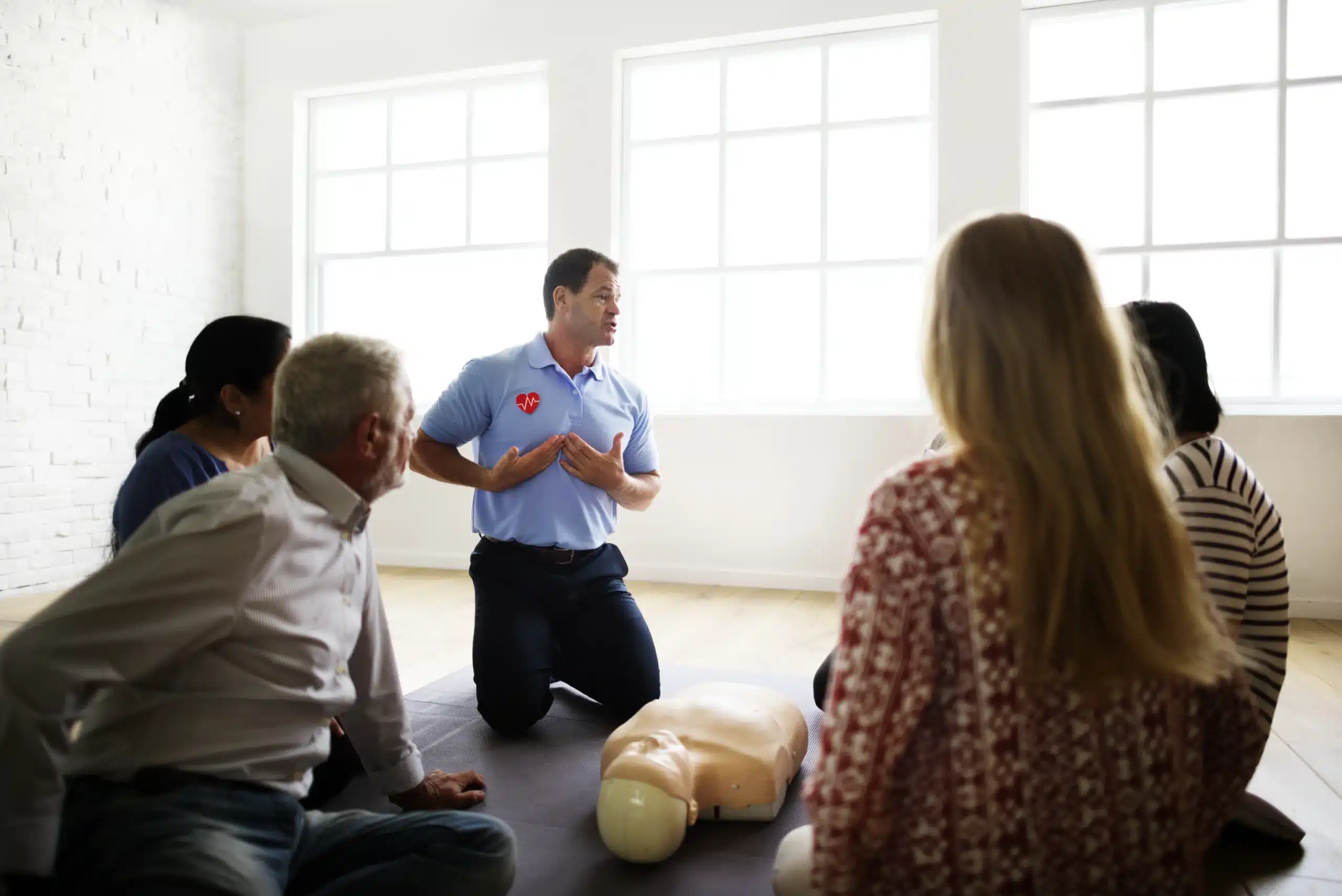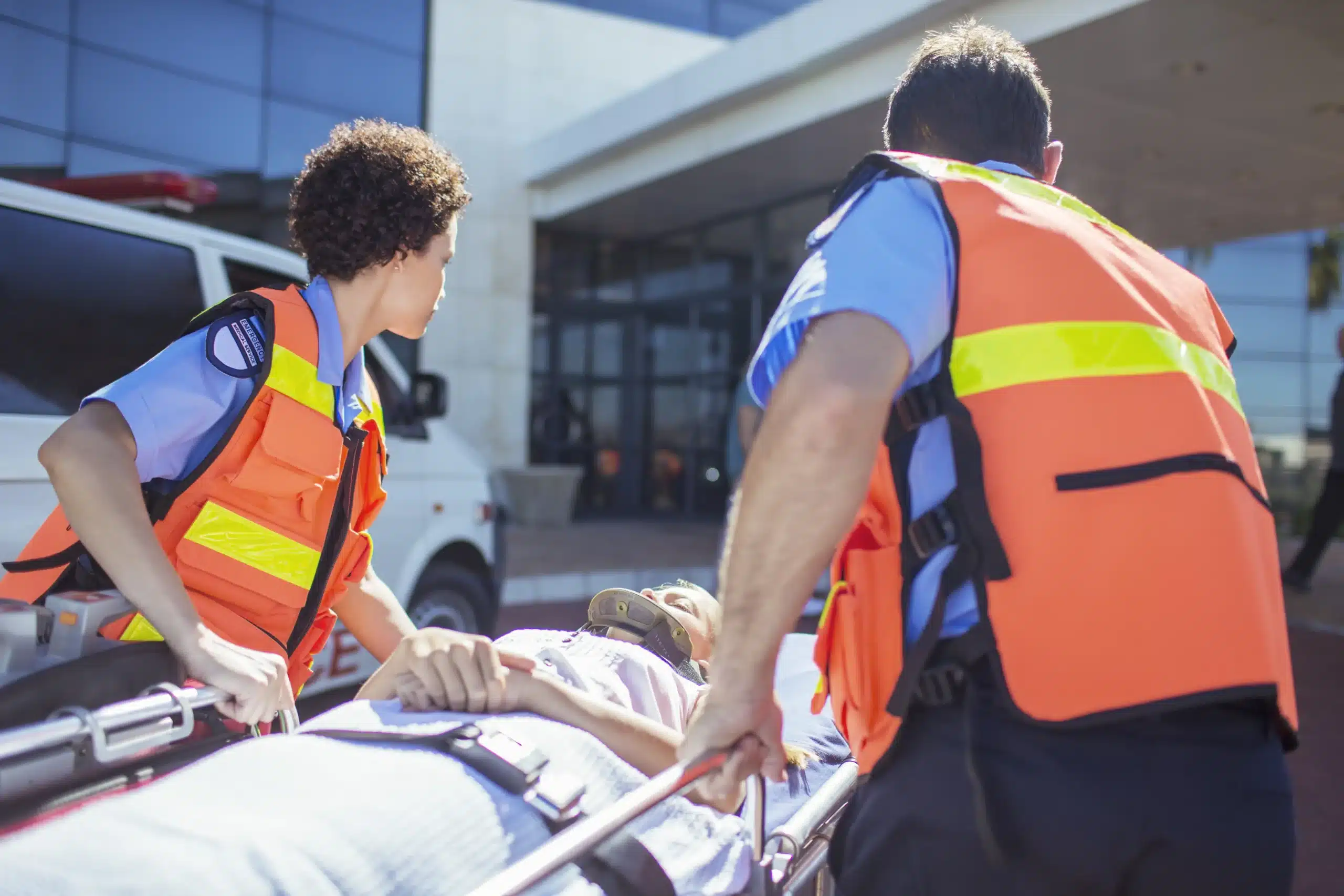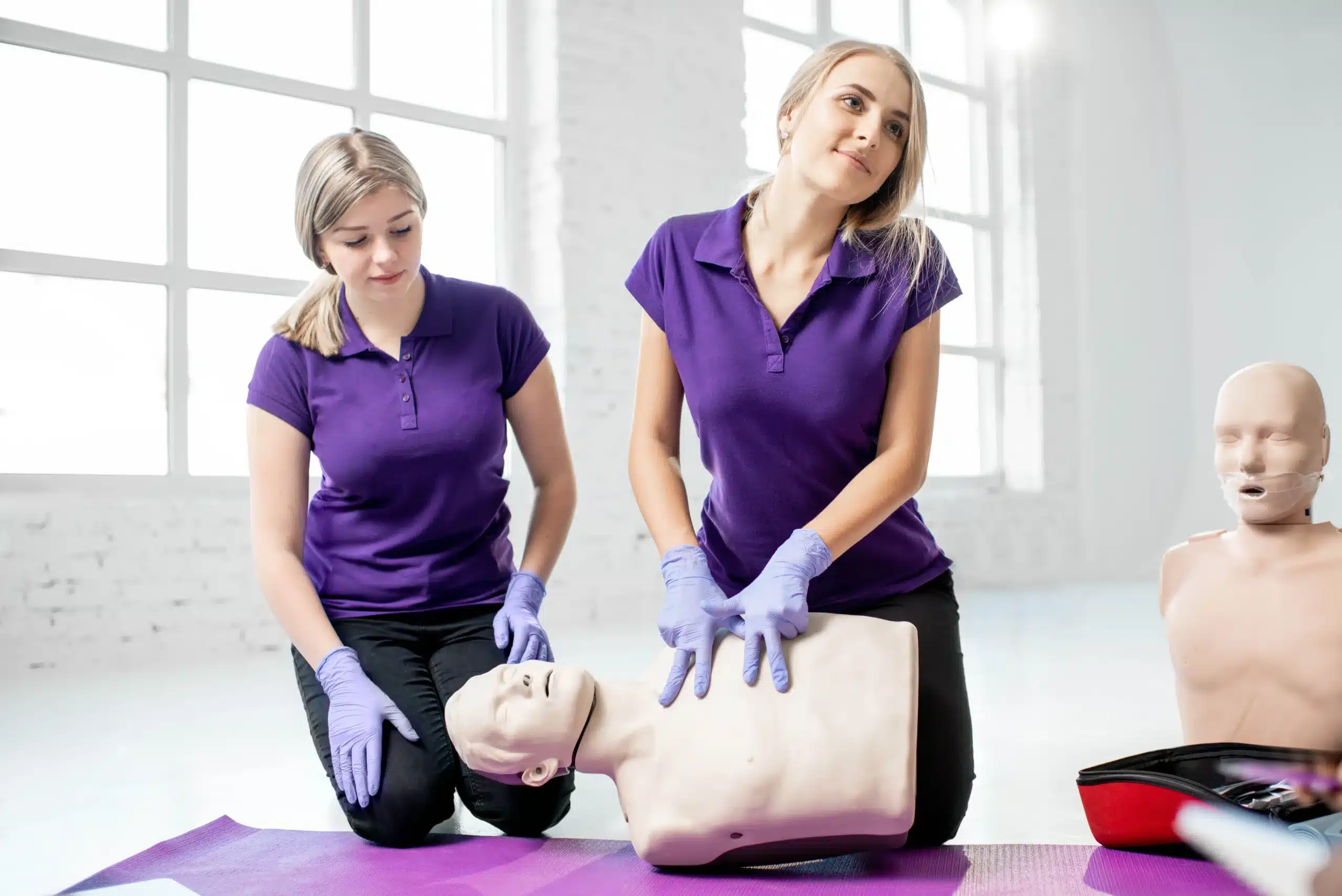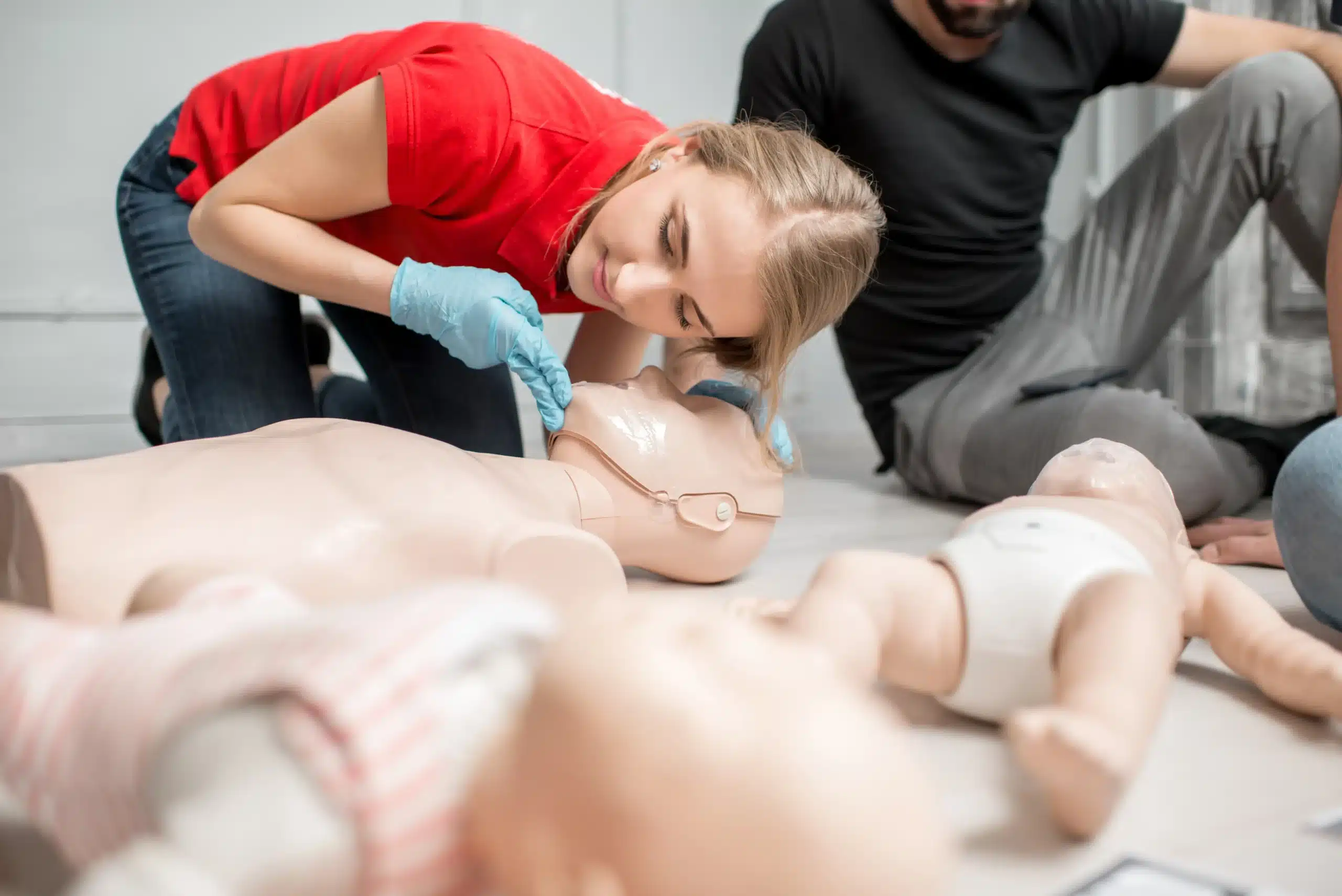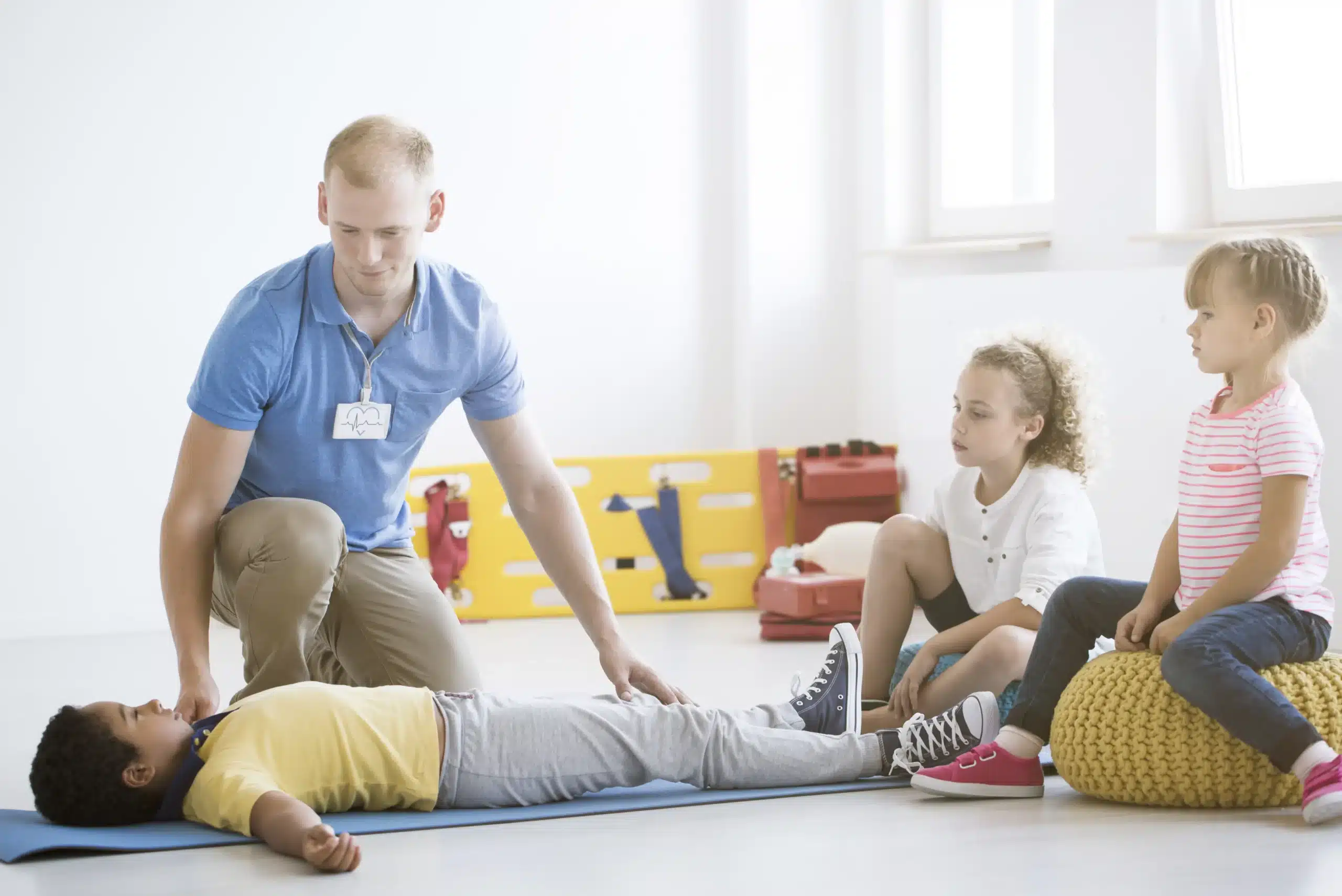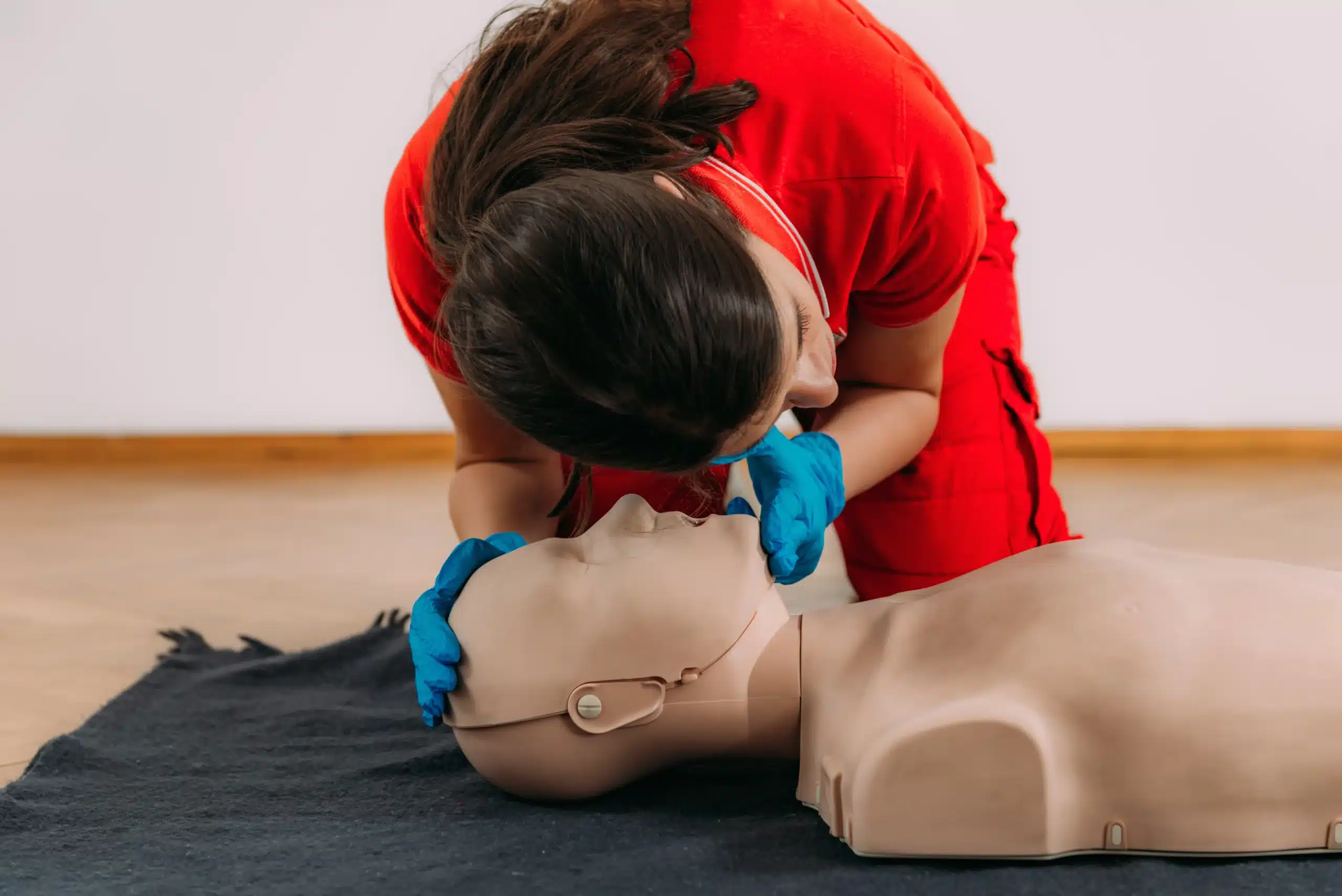In a medical emergency, knowing CPR can give you the confidence to act quickly and potentially save a life. This guide provides a detailed overview of CPR classes in Stockton, California, walking you through the process of becoming certified. Whether you’re a healthcare professional, a childcare provider, or simply someone who wants to be prepared for any situation, we’ll cover the different types of CPR training available, factors to consider when choosing a class, how certification works, the costs involved, and where to find reputable training providers in Stockton. We’ll also address common concerns and offer helpful resources to support you on your journey to becoming CPR certified.
Key Takeaways
- CPR knowledge empowers you to save lives: Equipping yourself with CPR skills enables effective responses during emergencies, significantly increasing survival rates for cardiac arrest victims.
- Select the right CPR class for your needs: Consider factors like in-person vs. online formats, instructor experience, and hands-on practice opportunities to maximize your learning.
- Maintain your CPR skills through regular practice: Keep your certification current and your skills sharp by refreshing your training and seeking out opportunities to practice.
What is CPR and Why is it Important?
Cardiopulmonary resuscitation (CPR) is a lifesaving technique used in emergencies when someone’s heartbeat or breathing has stopped. It combines chest compressions and rescue breaths to maintain blood flow to the brain and other vital organs until professional medical help arrives. Learning CPR is crucial because it can significantly increase the chances of survival for someone experiencing cardiac arrest. The American Heart Association emphasizes the importance of learning CPR to be prepared for an emergency. For more information on recovery after cardiac arrest, read this article. Taking a CPR class equips you with the skills to respond effectively in these critical situations.
Common CPR Misconceptions
Several misconceptions about CPR can prevent people from taking action during emergencies. One myth is that CPR will always revive someone in cardiac arrest. While CPR is critical for maintaining blood flow and oxygenation, it doesn’t guarantee survival. Richmond Training Concepts discusses this and other CPR myths in more detail. Another misconception is the fear of causing harm while performing CPR. Many hesitate to act, worried they might injure the person. However, CPR is designed to be a safe and effective method for emergency care. CPR Baton Rouge addresses this concern, debunking the myth that CPR is inherently dangerous.
Real-Life CPR Uses
The importance of CPR extends beyond the immediate act of saving a life. It also has a profound psychological impact on those who perform it. Studies show that people who administer CPR often experience varying physical and emotional responses. The American Heart Association acknowledges these experiences, highlighting the psychological impact of performing CPR. Learning CPR not only prepares you to potentially save a life but also empowers you to act confidently and effectively during a crisis. Consider registering for a local CPR course to gain these essential skills.
CPR Classes in Stockton: What’s Available?
Finding the right CPR class can feel overwhelming with so many options. This section breaks down the different types of CPR training in Stockton, so you can choose the best fit.
BLS Courses
Healthcare providers, like doctors, nurses, and EMTs, often require Basic Life Support (BLS) certification. BLS courses cover essential life-saving skills for cardiac arrest and other emergencies, including CPR, AED use, and rescue breaths. These skills are crucial for professionals in hospitals, clinics, and other healthcare settings. If you’re pursuing or currently hold a healthcare position, a BLS course is likely required.
First Aid & CPR Combo Classes
Combining First Aid and CPR training makes you a more well-rounded responder. These combo classes teach how to handle common injuries like cuts, burns, and sprains, in addition to CPR and AED use. This comprehensive approach is valuable for anyone, from parents and teachers to workplace safety officers. It’s a great option if you want a broader skillset for various emergencies.
Pediatric CPR Training
For those working with children, Pediatric CPR training is essential. This specialized course focuses on CPR and first aid techniques for infants and children. Childcare providers, teachers, camp counselors, and parents can benefit from this training, equipping them with the knowledge and confidence to respond effectively to emergencies involving young ones.
ACLS
Advanced Cardiac Life Support (ACLS) certification goes beyond BLS basics. It’s designed for healthcare professionals who manage cardiac arrest and other cardiovascular emergencies. ACLS courses cover advanced airway management, pharmacology, and team dynamics during resuscitation. This training is typically required for physicians, nurses, paramedics, and other advanced healthcare providers.
PALS
Pediatric Advanced Life Support (PALS) is the pediatric equivalent of ACLS, providing healthcare professionals with the skills to manage pediatric emergencies, from respiratory distress to cardiac arrest. Like ACLS, PALS training is geared towards doctors, nurses, paramedics, and other professionals who regularly treat children in emergency settings.
Choosing the Right CPR Class
So, you’re ready to learn CPR? Great! Figuring out which class is best for you can feel a little overwhelming with so many options. This section will walk you through key factors to consider when choosing a CPR class in Stockton.
Determine Your Needs
First, think about why you want to learn CPR. Are you a healthcare provider needing to maintain your BLS certification? Or are you a parent, teacher, or community member wanting to learn life-saving skills? Different courses cater to different needs. Basic Life Support (BLS) courses through the American Heart Association are essential for healthcare professionals, while CPR/AED courses are generally designed for the public. Clearly defining your goals will help you pick the right course. For healthcare providers, check out our BLS course.
Consider Your Schedule & Learning Style
Life gets busy, so finding a class that fits your schedule is important. Think about what works best for you. Do you prefer weekend classes, evening sessions, or maybe a more intensive weekday course? Also, consider how you learn best. Do you thrive in a traditional classroom setting, or do you prefer the flexibility of online learning? Luckily, there are options for everyone. Contact us to find a schedule that works for you.
Online vs. In-Person Training
Online CPR courses offer a convenient way to learn the basics, but they typically don’t include the hands-on practice required for certification. In-person training provides the opportunity to practice skills on mannequins with a certified instructor, which is essential for mastering CPR techniques. In-person CPR classes usually result in a two-year certification that meets Occupational Safety and Health Administration (OSHA) requirements, unlike online-only courses. If certification is your goal, an in-person class is the way to go. We offer a variety of in-person CPR classes in Stockton.
Blended Learning
If you like the idea of online learning but also want the benefits of hands-on training, consider a blended learning approach. These courses combine online modules with in-person skills sessions. This format offers flexibility while ensuring you get the practical experience you need to feel confident performing CPR. Blended learning can be a great option for those with busy schedules who still value hands-on instruction. Check our website for information on upcoming CPR courses and available formats.
CPR Certification: How it Works
CPR certification confirms you’ve completed a CPR course and can perform the techniques correctly. It’s particularly important for healthcare providers, childcare professionals, and those in jobs requiring CPR knowledge. Here’s how it works:
What Happens During Training?
CPR training combines theory and hands-on practice. You’ll learn the steps of CPR—chest compressions, rescue breaths, and how to recognize cardiac arrest. You’ll spend a good chunk of time practicing these skills on mannequins, building muscle memory and confidence. Instructors demonstrate techniques and provide feedback, ensuring you’re comfortable performing CPR in a real-life situation. The American Red Cross offers in-person, online, and blended learning options (a mix of online and in-person instruction). In-person training is key for hands-on practice and is often required for certain certifications.
Certification Validity & Renewal
CPR certifications are usually valid for two years, keeping your skills and knowledge up-to-date. While convenient, online CPR courses generally don’t offer the hands-on practice needed for official certification. To maintain your certification, you’ll need to retake the course and show your skills before it expires. This refresher reinforces your skills and covers any updated guidelines. Resources like Professional CPR provide information on CPR class options in Stockton.
OSHA Compliance
For many workplaces, especially those following Occupational Safety and Health Administration (OSHA) regulations, in-person CPR training is essential. These classes satisfy OSHA requirements and provide the necessary documentation. Online-only CPR courses typically don’t meet OSHA certification standards. The American Red Cross offers in-person classes that result in a two-year certification meeting OSHA standards. Choose a course that aligns with any workplace requirements.
CPR Class Costs in Stockton
Knowing the price of CPR certification in Stockton helps you budget and find the best value. Several factors influence the final cost, including the type of course, available discounts, and whether you’re training with a group. Let’s break down these factors to give you a clearer picture.
Average Course Prices
CPR class costs in Stockton, CA, vary depending on the type of certification you need. Basic adult CPR courses typically range from $20 to $55. Adding pediatric CPR instruction often increases the cost, usually landing somewhere between $25 and $40. Combined CPR and First Aid certification courses generally cost between $40 and $60.
Safety Training Seminars offers a Low Price Guarantee for our courses, ensuring you receive high-quality training at competitive rates. We believe essential, life-saving skills should be accessible to everyone.
Discounts & Promotions
Many training providers offer discounts and promotions throughout the year. Keep an eye out for special offers, which can sometimes lower the cost of your CPR training. For example, organizations like the American Red Cross may offer discounts or promotions on their CPR classes in Stockton. It’s always a good idea to check directly with the provider for current deals.
Group Training
If you’re coordinating training for a group, such as workplace colleagues or a community organization, explore group discounts. Many CPR training centers, including Safety Training Seminars, offer reduced rates for group training. This training is often a convenient and cost-effective way to equip your team with these vital skills. Contact us to discuss your group training needs and learn about customized programs for your organization.
Top CPR Trainers in Stockton
Finding the right CPR training can feel overwhelming with so many options. To help you, we’ve compiled a list of reputable CPR trainers in Stockton, highlighting what makes each one unique. This list includes a variety of options, from nationally recognized organizations to local providers.
Safety Training Seminars
Safety Training Seminars, known for their low price guarantee and commitment to customer service, offers American Heart Association courses. They understand that hesitation during cardiac emergencies can have devastating consequences, so they work to debunk common CPR myths, empowering students to act confidently. You can explore their BLS, ACLS, and PALS certifications, as well as their EMSA Child Care Health & Safety course. This focus on dispelling misinformation makes them a valuable resource for anyone seeking comprehensive CPR training.
American Red Cross
The American Red Cross is a trusted name in CPR training, and their Stockton branch offers a variety of courses to fit your needs. You can choose from in-person CPR/AED classes, online learning, or a blended learning experience. Their two-year certification meets OSHA requirements, making them a solid choice for individuals and workplaces.
Professional CPR
For those seeking an established provider in Stockton, Professional CPR has been offering training since 2001. They provide CPR, First Aid, BLS, and AED instruction, catering to both individuals and groups. This long-term presence in the community speaks to their commitment to providing essential life-saving skills.
Stockton CPR Certification
Stockton CPR Certification provides daily classes in CPR, BLS, ACLS, PALS, and First Aid, all certified by the American Heart Association. Their focus on accessibility and convenient enrollment makes fitting this life-saving training into your busy schedule easier.
Local Hospitals & Medical Centers
Many local hospitals and medical centers in Stockton offer CPR training courses. These institutions understand the critical role of bystanders in emergencies and often provide resources and support for those who have performed CPR. Check with hospitals like St. Joseph’s Medical Center or Dameron Hospital for potential training opportunities. The American Heart Association recognizes the importance of supporting these individuals, viewing them as heroes regardless of the outcome.
Community Colleges & Adult Education
Community colleges and adult education programs are another excellent resource for CPR training. These programs often offer flexible scheduling and group discounts, making them a cost-effective option. Check with local community colleges like San Joaquin Delta College or adult education centers for their course catalogs. For example, the Healthcare Learning Center offers on-site CPR classes tailored to groups.
Qualities of a Good CPR Class
Finding the right CPR class involves more than just picking a date and time. It’s about ensuring you receive high-quality instruction that prepares you to confidently handle real-life emergencies. Here’s what to look for:
Instructor Qualifications
A good CPR instructor should be more than just knowledgeable—they should have real-world experience. Look for instructors who are certified and actively work as first responders or healthcare providers. This practical experience translates into valuable insights you won’t find in a textbook. For example, Professional CPR in Stockton highlights its instructors’ experience as first responders and educators, ensuring students receive practical training alongside the necessary theoretical knowledge.
Hands-On Practice
CPR is a skill you learn by doing. A good CPR class emphasizes hands-on practice, giving you ample opportunity to perform compressions, practice rescue breaths, and use an AED on training manikins. The American Red Cross stresses the importance of this hands-on training for developing proficiency and earning your certification. This practical experience builds confidence and muscle memory, crucial for responding effectively under pressure.
Up-to-Date Materials & Equipment
Medical best practices are constantly evolving. Ensure your chosen class uses current American Heart Association guidelines, updated materials, and well-maintained equipment. Details like clean classrooms and courteous staff, as mentioned by Professional CPR, contribute to a positive learning environment. These details, along with access to well-maintained equipment, enhance the learning experience and ensure you’re familiar with the latest techniques and tools. Having refreshments available is a nice bonus too.
Class Size & Individual Attention
A crowded classroom can make it difficult to get the personalized feedback you need. Smaller class sizes allow instructors to provide individual attention, correct mistakes, and offer tailored guidance. Look for classes with limited seating—Professional CPR encourages early registration to secure a spot—to ensure you receive the support you need to master CPR techniques.
Prepare for Your CPR Class
Getting ready for your CPR class isn’t just about showing up; it’s about setting yourself up for a successful learning experience. A little preparation beforehand can make a big difference in how much you absorb and how confident you feel using your new skills.
What to Bring
Keep it simple. You’ll want a valid photo ID and anything else specifically requested by your chosen training center, like Safety Training Seminars. Comfortable clothing is key, since CPR classes involve hands-on practice and you’ll want to move freely.
Pre-Course Study
While not required, reviewing CPR basics before class can give you a head start. The American Heart Association offers helpful online resources and videos to familiarize yourself with the techniques. Even a quick overview can improve your understanding and retention during the actual class. Check with your instructor at Safety Training Seminars to see if they have any recommended pre-course materials.
Maintain Your Skills
CPR certification typically lasts two years, but it’s important to remember that these skills can fade over time. Regular practice and refresher courses are crucial for staying sharp and ready to respond effectively in an emergency. Think of it like any other skill—consistent upkeep is essential.
Using CPR in Your Community
Learning CPR isn’t just about getting certified; it’s about being prepared to help in your community. Local training sessions and community events can be great opportunities to practice your skills and build confidence. By actively participating, you contribute to a safer environment for everyone. The American Heart Association emphasizes the importance of community involvement in cardiac arrest survival. Consider checking with local organizations or your chosen CPR trainer, like Safety Training Seminars, for opportunities to engage with others in your community.
Find CPR Class Reviews
Finding the right CPR class is like finding the right pair of shoes—it needs to fit your needs. Reviews and recommendations can offer valuable insights into the experiences of others, helping you make an informed decision.
Online Reviews & Testimonials
Start your search by checking online reviews and testimonials. Sites like Yelp, Google Reviews, and even Facebook can offer a glimpse into what previous students thought about a particular course or instructor. Look for comments that discuss the instructor’s teaching style, the clarity of the material, and the amount of hands-on practice provided. For example, positive reviews for LifeSaver CPR in Stockton often mention engaging instructors and informative content. These firsthand accounts can give you a sense of what to expect. Reading reviews on Yelp can also be beneficial.
Local Recommendations
Don’t underestimate the power of word-of-mouth! Ask friends, family, colleagues, or even your doctor if they have any CPR class recommendations in the Stockton area. Local community centers and hospitals might also have suggestions.
Questions to Ask When Reviewing
As you browse reviews and consider different CPR classes, keep a few key questions in mind. Asking these questions can help you narrow down your options and choose a course that aligns with your learning style and goals:
- Instructor Qualifications: Are the instructors certified by a reputable organization like the American Heart Association? Do they have real-world experience?
- Course Structure: What topics does the course cover? Is it tailored to healthcare providers, or is it designed for the general public? Does it align with the American Heart Association guidelines?
- Hands-On Practice: How much opportunity will you have to practice CPR techniques on mannequins? This practice is crucial for building confidence and muscle memory.
- Student Feedback: What are past students saying about their experience? Look for patterns in the reviews—are people consistently praising the instructor’s knowledge or the course’s organization?
By taking the time to research and ask the right questions, you can find a CPR class in Stockton that empowers you to confidently respond in an emergency.
CPR Class FAQs
This section addresses some common questions about CPR classes in Stockton.
Common Concerns
One frequent concern is the fear of causing harm, such as broken ribs, while performing CPR. While rib fractures are a possibility, providing effective chest compressions is crucial during cardiac arrest. The goal is to circulate blood and oxygen to vital organs. Another common worry is the emotional impact of performing CPR in a real-life situation. The American Heart Association acknowledges the potential psychological effects and emphasizes the importance of support for anyone who has performed CPR, regardless of the outcome. Knowing you did everything you could can make a world of difference.
Resources for Finding Classes
Finding the right CPR class is easy with reputable organizations like the American Heart Association, which sets the standards for CPR education and training. For local options, consider training centers like the Healthcare Learning Center in Stockton, which offers convenient on-site training for groups. This can be a great option for businesses or organizations looking to certify multiple employees at once. Safety Training Seminars also offers a variety of CPR and first-aid certification courses in Stockton, including American Heart Association BLS, ACLS, and PALS courses.
Unique Features of Stockton CPR Training
Stockton offers a variety of CPR training options to fit your needs. Providers like LifeSaver CPR offer specialized courses like AED training, alongside standard CPR certification. The American Red Cross in Stockton provides flexible learning formats, including in-person, online, and blended learning, allowing you to choose the style that best suits your schedule and preferences. This flexibility is especially helpful for busy professionals or those who prefer a self-paced learning environment. Safety Training Seminars is committed to providing excellent customer service and offering the lowest prices in San Joaquin County, serving Stockton, Tracy, and Lodi, CA. They also offer the EMSA Child Care Health & Safety course.
Related Articles
- Why CPR is Important in Healthcare – Stockton CPR Classes Blog
- Debunking Common CPR Myths
- CPR & First-aid Classes in Stockton, CA – Stockton CPR Classes
- Why Every Workplace Needs CPR and First-Aid Training
- Blog – CPR with Stockton CPR Certification – Guides & Insights
Frequently Asked Questions
What if I’m worried I’ll hurt someone while performing CPR? It’s natural to be concerned about causing harm, like breaking ribs. While rib fractures are possible during CPR, remember that the priority is to circulate blood and oxygen to vital organs during cardiac arrest. The benefits of performing CPR far outweigh the risks. A good CPR class will address these concerns and prepare you to act confidently.
How do I choose between online and in-person CPR training? Online courses offer convenience, but in-person classes provide the hands-on practice with mannequins and feedback from a certified instructor that are essential for certification and true preparedness. If you need official certification, especially for a job, in-person training is the way to go. If you just want to familiarize yourself with the basics, an online course might suffice.
How much does CPR certification cost in Stockton? Costs vary depending on the course type and provider. Basic CPR classes typically range from $20 to $55, while adding First Aid or pediatric CPR can increase the price. Look for providers offering discounts, like Safety Training Seminars’ Low Price Guarantee, or group rates for workplace training.
What should I expect during a CPR class? Expect a mix of instruction and hands-on practice. You’ll learn the steps of CPR, including chest compressions, rescue breaths, and how to recognize cardiac arrest. A significant portion of the class will involve practicing these skills on mannequins with guidance from your instructor.
How can I find CPR classes near me in Stockton? Several resources can help you locate CPR classes. The American Heart Association website is a great starting point. You can also check with local hospitals, community centers, and training providers like Safety Training Seminars, the American Red Cross, or Professional CPR. Online reviews and recommendations from friends or colleagues can also help you find a reputable class.
